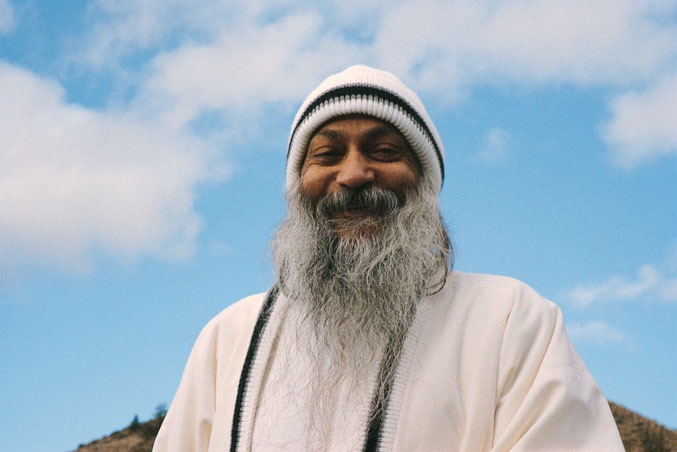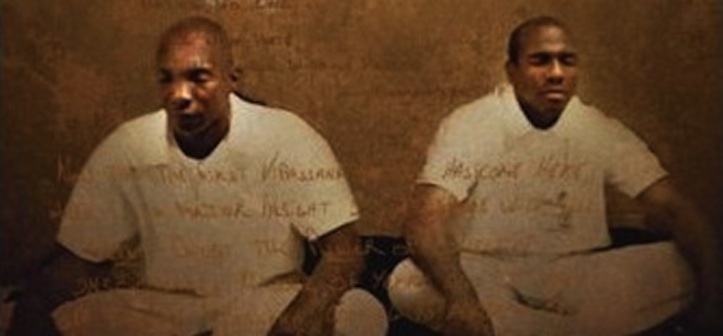There was a monk who called himself “The Master of Silence.”
Actually he was a fraud and had no genuine understanding.
To sell his humbug Zen he had two eloquent attendant monks
to answer questions for him,
but, as if to show his inscrutable silent Zen,
he himself never uttered a word.
One day, during the absence of his two attendants,
a pilgrim came to him and asked:
Master, what is the Buddha?
Not knowing what to do, or how to answer,
he looked desperately around in all directions
for his missing mouthpieces.
The pilgrim, apparently pleased and satisfied,
thanked the master, and set out again on his journey.
On the road the pilgrim met the two attendant monks
on their way home.
He began telling them enthusiastically
what an enlightened being this Master of Silence is.
He said: I asked him what Buddha is
and he immediately turned his face to the east and to the west
implying that human beings are always looking for Buddha
here and there, but actually,
Buddha is not to be found in any such directions.
Oh what an enlightened master he is,
and how profound his teachings!
When the attendant monks returned,
the Master of Silence scolded them thus:
Where have you been all this time?
A while ago I was embarrassed to death and almost ruined
by an inquisitive pilgrim.
Life is a mystery.
The more you understand it, the more mysterious it becomes.
The more you know, the less you feel that you know.
The more you become aware of the depth, the infinite depth,
the more it becomes almost impossible to say anything about it.
Hence silence.
A man who knows remains in such awe,
such infinite wonderment that even breathing stops.
Standing before the mystery of life, one is lost completely.
But there are problems,
and the first problem with the mystery of life
is that there is always the possibility of frauds,
people who can deceive others, people who can cheat.
In the world of science that is not possible.
Science moves on a plain ground with infinite caution -
logical, rational. If you utter something nonsensical,
immediately you will be caught,
because whatsoever you say can be verified.
Science is objective, and any assertion, any statement,
can be verified in experiments in the laboratories.
With religion everything is inner, subjective, mysterious,
and the path is not on a plain. It is a hilly track.
There are many ups and many downs,
and the path moves like a spiral.
Again and again you come to the same place,
maybe a little higher.
And whatsoever you say cannot be verified,
there is no criterion of verification.
Because it is inner, no experiment can prove or disprove it;
because it is mysterious, no logical argumentation can decide this way or that.
That's why science is one,
but there exist almost three thousand religions in the world.
You cannot prove any religion false. Neither can you prove
any other religion to be true or authentic.
That is not possible, because no empirical test is possible.
A Buddha says that there is no self inside.
How to prove this or how to disprove this?
If somebody says, "I have seen God", and he sounds sincere,
what to do? He may be a deluded lunatic,
he may have seen a hallucination,
or he may really have seen the reality of existence.
But how to prove or disprove?
He cannot share his experience with anybody, it is inner.
It is not like an object you can place in the middle
and everybody can watch it, and everybody can experiment
and dissect it. You have to take it in faith.
He may sound absolutely sincere, and may be deluded:
he may not be cheating you, trying to cheat you,
he may be himself deceived. He may be a very true person
but he has seen a dream and thinks it is real -
sometimes dreams have the quality that they look more real
than the reality itself. Then dreams look like visions.
He has heard the voice of God
and he is so filled with it, so thrilled. But what to do?
How to prove that he has not gone mad,
that he has not projected his own mind and idea?
There is no possibility.
If there is one genuine religious man,
there are ninety-nine others all around him.
A few of them are deluded: poor, simple fellows, good at heart,
not trying to harm anybody, but still they harm.
Then there are a few cheats, robbers, deceivers:
cunning, clever people who are knowingly doing harm.
But the harm pays. You cannot find
a better business in the world than religion.
You can promise, and there is no need to deliver the goods,
because the goods are invisible.
I have heard an anecdote - in America
they invented invisible hair-pins for ladies.
One lady was purchasing them at a supermarket
and the salesman gave her a packet of invisible hairpins.
She looked in the box and she couldn't see any.
Of course, they were invisible, so how can you see?
And she said: "But I don't see anything in it."
The man said: "They are invisible, so how can you see?"
So the lady asked: "Really? Are they invisible?"
The man said: "You are asking me? For seven days
we have been out of stock, and still we are selling them.
They are absolutely invisible."
When things are invisible,
you can go on selling, promising.
There is no need to deliver the goods,
because in the first place they are invisible,
so nobody can ever detect them.
And you cannot find a better business than religion,
because the goods are invisible.
I have seen many people being deceived, many people deceiving.
And the thing is so subtle
that nothing can be said for or against.
For example, I know a man
who is a simple, plain, stupid man.
But stupidity has its own qualities.
Particularly in religion,
a stupid man can look like a PARAMAHANSA.
Because he is stupid, his behavior is unexpected,
just like an enlightened man. The similarity is there.
Because he is stupid, he cannot utter
a single rational statement -just like an enlightened man.
He is foolish, he doesn't know what he is saying,
how he is behaving. Suddenly he can do anything:
and this sudden doing seems to be as if he belongs
to another world. He has epileptic fits,
but people think he is going into samadhi.
He needs electric shock treatment!
Suddenly he will go into a fit and swoon, and the followers will beat their drums and they will sing to the glory of God, that their master has gone into great samadhi, ecstasy. And his mouth starts foaming, and his saliva flows out - he is simply in a fit. He has no intelligence. But that is a quality, and there are deceivers around him who go on spreading things about the "baba".
And many things happen near him: that is the miracle. Many things happen, because many things happen of their own accord. The baba is in a swoon, and many people will feel their kundalini rising. They are projecting. There is a certain phenomenon: if you sit quietly for a long period, the body accumulates energy, and then the body starts moving, feeling restless. Sudden jerks start coming - they think this is kundalini. Kundalini is rising and when it rises in one person, how can you lag behind? Then others start. Then it is just like if one person goes to the toilet, then others feel the urge: if one person sneezes, others have a tremendous sneeze coming to them. It becomes infectious. But with so many things happening, the baba must be in samadhi. He is simply in a fit. In the East it has been my observation that only one genuine person exists, ninety-nine are false - either themselves deceived, simple, poor people; or deceivers, cunning, clever people.
This can go on, because the whole phenomenon is invisible. What to do? How to judge? How to decide? Religion is always dangerous. It is dangerous because the very terrain is mysterious, irrational. Anything goes, and there is no outer way to judge it. And there are people with their gullible minds, always ready to believe something, because they need some foothold. Without belief they feel unanchored, uprooted; they need somebody to believe in, they need somewhere to go and feel anchored and rooted.
Belief is a deep need in people. Why is it a deep need? Because without belief you feel like a chaos; without belief you don't know why you exist; without belief you cannot feel any meaning in life. No significance seems to be there. You feel like an accident with no reason at all to be here. Without belief, the question arises: Why are you? Who are you? From where are you coming? Where are you going? And there is not a single answer - without belief there is no answer. One feels simply without any meaning, an accident in existence, not needed at all, not indispensable. You will die and nobody will bother; they will all continue. You feel something is lacking, a contact with reality, a certain belief. That's why religions exist - to supply beliefs, because people need them.
A person without belief has to be very, very courageous. To live without belief is to live in the unknown, to live without belief is a great daring. Ordinary people cannot afford that. With too much daring, anguish comes in, anxiety is created. And this has to be noted: to me a real religious person is without belief. Trust he has, but not belief, and there is a vast difference between the two.


































































































































































































































































































